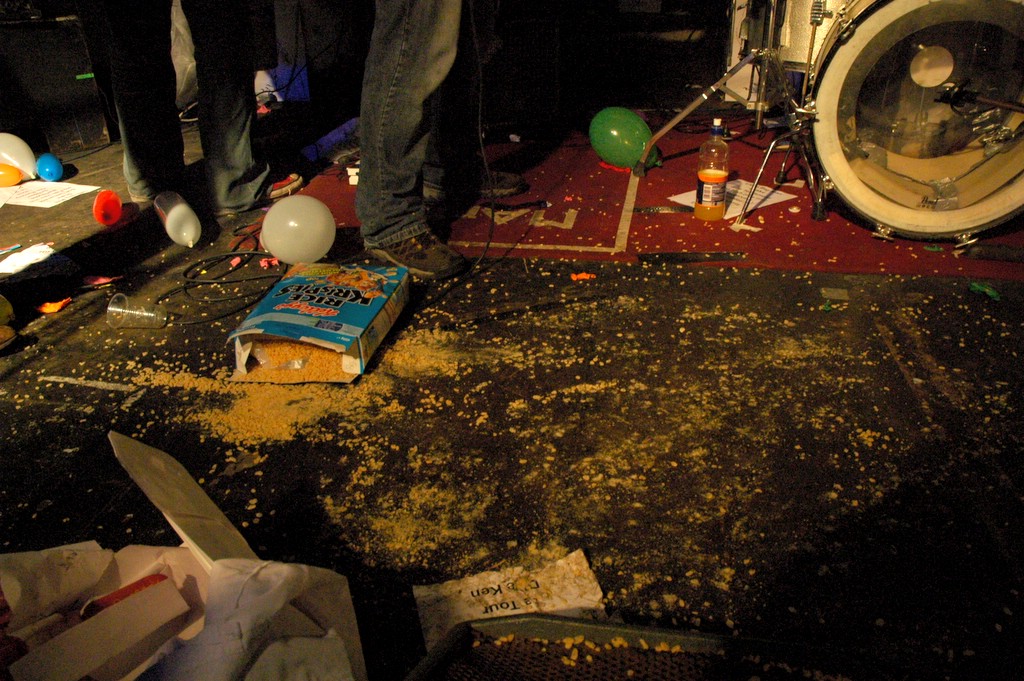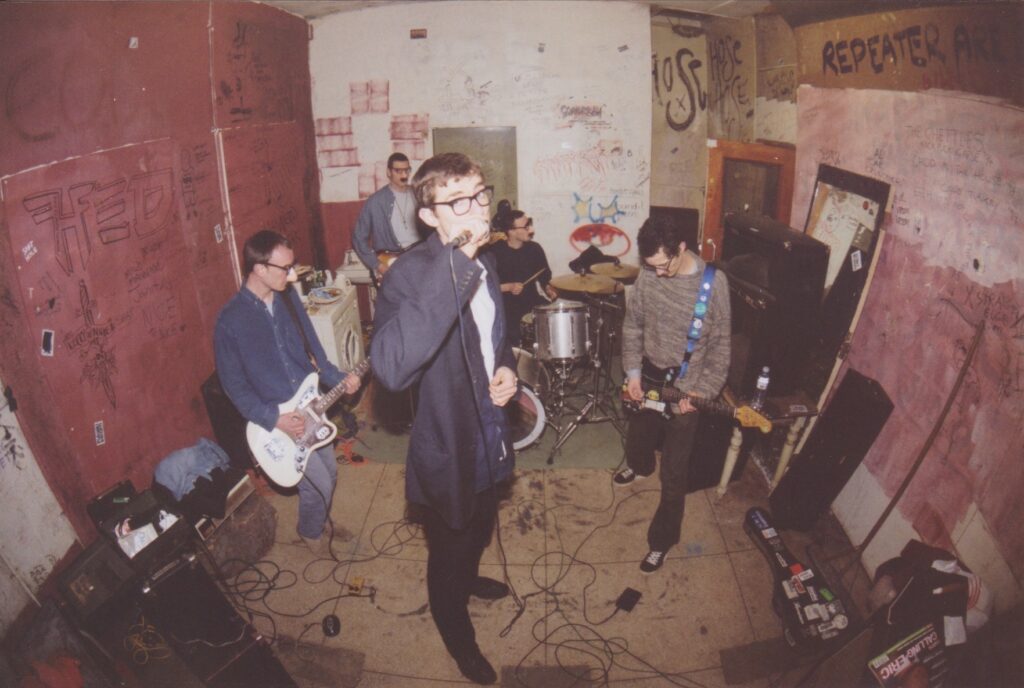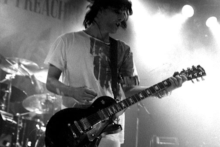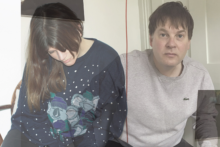In the early 17th Century, what became known as the Chalybeate waters were discovered in what would become The Pantiles, a Georgian parade which nestles at the lowest point of the spa valley in the Kent town of Royal Tunbridge Wells. A courtier Dudley North, who found the spring in 1606, claimed the waters cured his ailing constitution and soon, royalty and gentry flocked to take the natural elixir bubbling from the ground. North’s eldest son’s physician said it could cure “the colic, the melancholy, and the vapours; it made the lean fat, the fat lean; it killed flat worms in the belly, loosened the clammy humours of the body, and dried the over-moist brain.”
Three centuries later it did indeed “make the lean fat and fat lean” with the formation in 1991 of local band Joeyfat. I was 15 when I first saw Joeyfat in Langton Green, a small village just outside of Tunbridge Wells. Its biggest claim to fame was being the place where the Subbuteo football game was invented and made. Joeyfat were confusing to my young brain. I didn’t like what I saw or heard, whether it was the jerking and lurching music or the incredibly tall singer who seemed to be talking, singing and screaming in a manner designed to annoy and irritate me. I walked away, adding them to my list of local bands I really didn’t like.
A couple of years later Jason Dormon, bassist and main composer of Joeyfat, opened up The Forum music venue. Like his earlier venture The Rumble Club, it was situated just across the road from the historic Pantiles. Joeyfat played the opening night and I was there. In the intervening time, I’d started to listen to Fugazi and Dischord bands. Maybe this gave me something to understand them by, the key to unlocking an appreciation of the power of Joeyfat, the intricacy of calmly threaded guitar picking intertwined with chug, giving way to distorted crescendos that crashed down to disappear as quickly they began. The rhythm section seemed inhumanly tight and precise. On top of it all, the towering figure of singer Matt Cole delivered spoken and sung, surreal and absurd narratives satirising the human condition through tragicomical character assassinations.I walked away elated: Joeyfat were my new favourite local band.
Joeyfat initially rose out of two separate local bands. “Matt and I were in a pop band, Big Pop Trotsky”, says Dormon. “I’d also started writing tunes for Couch Potatoes, a hardcore band, with Dave Gamage on guitar and Jim Booth on drums. With Big Pop Trotsky I’d started writing slightly more up-tempo songs, but the rest of the band was like this is a bit fast, not really indie, it’s more like West Coast hardcore”. At The Rumble Club Dormon was booking and watching bands like Milk, Th’ Faith Healers, Jailcell Recipes and Green Day. “So here I am in this pop band, and these bands are playing the club and I’m thinking ‘I wouldn’t mind playing with them’.”
Seeing Fugazi in Kent coastal town Whitstable was a game-changing moment for both Dormon and Cole. “We were already playing at that point as a four-piece,” recollects Cole. “I was still playing guitar, but looking back it feels like we realised we were on the right track, that you can do it this way, not only musically but with the attitude as well.” Although hardcore music played a large role in the development of Joeyfat’s music, the real driving force within the group was to open out ideas of composition, structure and lyrical stagecraft, while introducing something spacious, intricate and melodic, combining synths and heavy discordant guitars, all underpinned by Dormon’s rich dubby bass.
At home Dormon has always worked out ideas on his Tascam four-track tape machine, layering bass, guitar, synths and programming drum machine parts to be augmented and built upon by the rest of the band. “I like a quite sharp attacking synth, that’s where a lot of the chug and staccato comes from, and trying to create space between the notes,” he says. “When you’re taking it to the band, it becomes more of a collaboration with whoever you’re working with at the time – they bring their own interpretation to a synth line, you then work out which of those parts are going to work on guitar.” The practicality of programming drum parts at home led to the development of Jim Booth’s extraordinary drumming: his mechanised patterns retaining a naturalistic but unnaturally tight aspect, stretching out precise minimal passages into full blown polyrhythmic bursts. Dormon recollects: “The hardcore music he’d been playing was quite technical anyway, but then part of me, in a really nice way, wanted to break Jim by giving him drum lines that he couldn’t play. And that became a bit of a challenge, he always delivered and just became a complete machine.”
Dormon cites the use of space as an intrinsic element to the creation of his tracks, which explore the gaps and spaces between the notes, focusing in on micro-silences that he sees as important as the sound itself. His thirst for new music has always been central to his development as an artist, citing as influences anyone from Arvo Pärt to Alien Sex Fiend, Blancmange to Botch, and The Four Brothers to the Gang of Four. Part of the journey of his listening experience has been to understand the music inside out, taking it apart and putting it back together again in an attempt to gain insights that might aid his process.
Joeyfat’s music is composed of two dual narratives running alongside each other, the unspoken intersecting paths of Dormon’s compositions and Matt Cole’s spoken, sung and screamed monologues knitted throughout each track. Onstage and on record Cole inhabits a multifaceted character, sometimes at war with his inner dialogues, sometimes goading the listener into abstract and ineffable responses, and at other times evoking banal imagery juxtaposed with cartoonishly phantasmagorical stories. “Initially I wrote the songs in that perspective, it’s designed to be the most embarrassing person in the room” expands Cole. “Debasing myself to the lowest, most unpleasant petty vindictive ridiculous person, I started writing a lot of songs from the perspective of that person who is a shit and looking at all the things they’re doing wrong.”
There’s a dream logic in many of Cole’s words where the viewpoints shift constantly. He’s in the songs himself as a character, but also viewing scenes from afar, criticising undisclosed events as they unfold beyond his control. “That’s a dialogue between two sides of one character basically, which I think most people probably have. There’s a duality in between the lizard brain and your instant reaction to stuff.”
The use of sprechgesang within contemporary British and Irish alternative acts has become a popular style over the last few years, with Black Country, New Road, Sleaford Mods, Fontaines DC, Dry Cleaning and Yard Act using this technique within their songs. Back in the early 1990s Cole’s use of speaking within songs was not necessarily a direct attempt to emulate other artists, he does reference Captain Beefheart and Gerard Langley of The Blue Aeroplanes. He also mentions the king of sprechgesang Mark E Smith, but doesn’t single him out as an influence first hand. “Originally it was a kind of a musical hall pastiche,” he explains, “no-one remembers music hall, even I’m too young to remember its heyday, but it’s also that thing in musicals when they go from singing to speaking as a narration, moving the plot on and then saying, ‘here’s the chorus’. That narration grew out of our first songs. It’s not all verse chorus singing, it’s a story, and you can tell that story by talking as well as singing. It’s growing from the narrative of the stories and you’re a narrator telling a story.”
Cole says the main influence is Dormon’s compositions themselves. They trigger the parts of his brain that bring forth his inner world building. He cites this music as a singular component throughout his life and all the years they’ve been working together. Dormon’s music continues to fire off the emotion he needs to continue writing for the band. “Over our years of writing together we have become woven into each other, it feels like a symbiotic relationship between the two of us. I’m not sure who’s the crocodile and who’s the bird cleaning its teeth, maybe it’s more like ivy winding around a tree. I’d definitely be the parasite.”
Joeyfat live sees Cole’s lofty figure bring a physical incarnation of his lyrical theatricality, in the form of costumes and props. Over the years he’s adopted the costume of a deranged astronaut, a matador, a chef, and worn t-shirts with hand-written slogans daubed across them, and a suit made of lights. Early shows would see Cole showering the audience with a box of breakfast cereal. “The Rice Krispies was a cod sumo thing, when sumo wrestlers throw salt into the ring before they fight. Rice Krispies would arc fantastically out of your hand and float beautifully.”

The band were soon getting written about in the music press; tours with Green Day and a John Peel session had major labels and A&R men sniffing around. “I was certainly very dismissive of all that really,” says Cole, “I just had no interest in it whatsoever, I’ve always really hated that business side of music, and anything getting in the way of the music.” But a reluctance to play the music industry game didn’t stop them seeping out into a wider consciousness. After Joeyfat opened up for Wire in Tunbridge Wells, an astonished Graham Lewis, who exclaimed, “Who are you, what on earth is going on?”, recommended them to Marc Riley who immediately booked them for a session on his show. Dormon laughs “And when we played with Pere Ubu, David Thomas goes, ‘Great band, shame about the name’.”
Mystified by Joeyfat’s lack of visibility and with a deep awareness of their importance to the wider history of post hardcore and UK experimental alternative scenes, Wrong Speed Records decided it was about time to affirm the band as the source of a sound that has dominated a huge swath of contemporary indie acts, directly and indirectly. Their obscurity was not one of missteps, band politics or tragedy, rather a concerted effort not to go down the path of many before them, and a run of reissues will begin to go some way to readdress that obscurity. This month sees the reissue of The Unwilling Astronaut, a collection of early singles and rarities, and their debut album, The House Of The Fat. And they are in good hands: Joe Thompson and Chris Summerlin of Wrong Speed Records are also members of wall-of-guitars band Hey Colossus, and have been fans of the band for the past 30 years.
The collection of tracks on The Unwilling Astronaut documents the band’s earliest incarnation as a brilliantly weird post-punk/hardcore band, whereas The House Of The Fat sees them move further out towards more psychedelic territory. Between 1996 and 2000, Joeyfat took a short hiatus with Cole working on his own band Club Giants and Dormon working on Unhome, a more post rock flavoured unit which included myself on vocals, Jon Richards and Phil Avey on guitars and Jim Booth on drums.
When Joeyfat reconvened in 2000 to work on new material, Dormon and Cole brought with them some of the ideas from their separate projects. “I think creatively we were so much more focused”, says Cole. “Jon Richards, who was in Unhome, was a massive part of The House Of The Fat.” Dormon agrees, “There’s an awful lot of Jon on that record. Jon and I were working together in Unhome, so in a way, maybe musically The House Of The Fat was Unhome meets early Joeyfat.” Richards’ spidery guitar lines and precise acoustic picking patterns compliment Dormon’s compositions perfectly. There’s a new fluidity with the introduction of electronics and fried synths thrown into the mix. Joeyfat’s collaborators – which have included producer and musician Al Wootton also of Holy Tongue; Thomas House of Sweet Williams, and Lawrence Price of TODD and Shit and Shine – have always been intrinsic to the progression of the band.
Dormon and Cole continue to work on new Joeyfat material, as well as on their duo Joeythin, which concentrates on electronics and vocals. “Jason is writing a lot of electronic music at the moment” says Cole “We did Joeythin first as something at The Forum, we filled the room with smoke and stuck a strobe on. Again, I just love Jason’s arrangements of that stuff. Some of those songs have been translated from Joeyfat to Joeythin and back again.”
Tunbridge Wells still plays an important part in the band’s existence. The venue Dormon co-founded in 1993, The Forum, has been recognised by NME, Music Week, The Independent and by the local borough, who awarded him a Civic Medallion. Their promotion of grassroots local talent and alternative culture in a town known for being conservative with both a small and a capital C (the Conservative stronghold finally lost to the Lib Dems last year), as well as appreciating its history, architecture and landscapes. Dormon observes “The Pantiles was built on the season, people coming down from London, for gambling and picking up prostitutes in these beautiful surroundings with the spring waters, it really is beautiful. The Common is amazing. Everything plays a part in the town’s uniqueness. I’m always going to fly the flag for Tunbridge Wells.”
The House Of The Fat and The Unwilling Astronaut are released on 7 February 2025. Visit the Wrong Speed Bandcamp to purchase





